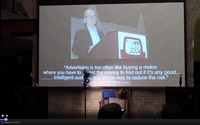Erwin Ephron Remembered As Guru, Mentor, Nudge, But Mostly A Writer
- by Joe Mandese @mp_joemandese, December 9, 2013

Media planning and research luminaries paid tribute to consultant Erwin Ephron last Thursday night during a
memorial in New York City where speakers recognized him not only for the important theories and applications he championed, but for the powerful way he communicated them in his public speaking, his
one-on-one conversations, and most importantly, in his writing.
“Language is the foundation of communication. Words are its building blocks. Words strung together become its sentences. Sentences become paragraphs. Paragraphs become thoughts. All of it put together is prose. Erwin had the gift of language,” Jon Swallen, Chief Research Officer of WPP’s Kantar Media unit recalled, noting, “He had a command of words and he used it -- harnessed it -- into the energy, into the power of prose. Complex thoughts translated into economical rhythmic sentences -- each word purposely and perfectly selected. His intellectual capacity made accessible to the audience through clever wordplay, educated metaphors and those silly art-clip graphics.”
advertisement
advertisement
Swallen’s reference to the clipart used by Ephron to illustrate many of the essays in his newsletters and books sparked laughter among the attendees, a who’s who of Madison Avenue thinkers who gathered in the Lower Manhattan offices of Simulmedia, which played host to the tribute.
Emceed by Advertising Research Foundation CEO Gayle Fuguitt, who also announced more details of an “Erwin Ephron Demystification Award” the foundation plans to bestow annually in memory of the important media planning theories Ephron championed, and the seemingly simple ways in which he sought to bring them across. It was his latter skill -- his ability to make complex ideas easy to understand -- that many of those paying tribute spoke most about.
Barry Fischer, executive vice president-market strategy at NBC Universal, who considers himself a disciple of Ephron, noted how when he was asked to teach a class earlier this year to help train young cable sales assistants, he gave out about 50 copies of Ephron’s book, “Media Planning - From Recency To Engagement,” which he said led to a series of follow-up questions and conversations with the young sales executives over the next few
Shortly after Ephron’s death, Fischer said he arrived at his office to find a condolence note on his desk from one of those assistants.
“It was short, it was kind, it was thoughtful, it was real, but what made the note incredibly special was that it was attached to a box of Kellogg’s cornflakes,” Fischer recalled, going on to explain the connection, “From page 19, chapter five [of Ephron’s book]: ‘Relevance isn’t mysterious. For Kellogg’s cornflakes, it may be as simple as an empty cereal box at breakfast.’
“Erwin’s empty cereal box has always been an incredibly wonderful and easy way to explain the complexities of relevance, reach and consumer behavior. It’s clear, smart, strategic, and incredibly clever. An amazing combination,” Fischer noted, adding, “Though I am deeply saddened by Erwin’s passing, I’m also reassured that, with a little help from all of us, the next generation of media executives will find in Erwin’s words the wisdom and clarity and humor that’s really guided so many of us here.”
Another speaker, consultant and former NBC research chief Nicholas Schiavone, said part of the reason for Ephron’s success as a writer and an influencer was the sense of humility he imbued his writing.
Reading from a copy of Ephron’s book, Schiavone quoted, “These essays are really stories about media. The true value of a story is not in the writing, but the reading, which helps to create a history of shared thinking about what it is we do.”
“What strikes me about Erwin’s approach to communication, was four things,” Schiavone offered: “What strikes me is its gentility, its collegiality, its thoughtfulness, and its creativity. All Erwin said he wanted to do was to nudge the business, Not push it, not pull it, just nudge it. I would say that makes him a real gentleman.”
He closed by invoking an Ephron quote that exemplified that: “Remember, none of us are as smart as all of us.”
Simulmedia Founder Dave Morgan also drew upon Ephron’s writing as a source of inspiration, not just for the traditional world of media planning Ephron came from, but for the hyper acceleration that has been caused by the kind of digital media and technologies people like Morgan helped pioneer.
Morgan, who said he was particularly influenced by Ephron’s essay, “Learning to Live in Lilliput,” which utilized the metaphor of “Gulliver’s Travels” to explain the impact of media fragmentation, said he was inspired to revisit the concept, and run more current data to see how the idea holds up today.
“Fortunately, Irwin Gotlieb is going to co-author the piece with me,” Morgan said, referring to the global CEO of WPP’s GroupM division then, giving a slight preview of the findings by noting “As you would expect, all the data has come back in and [Ephron] was far more right 16 years later.”Video streaming by Ustream



Thank you, Joe. This is a thoughtful excellent review of the Erwin Remembered Tribute. Erwin the writer would approve -- and Erwin the man would be pleased.